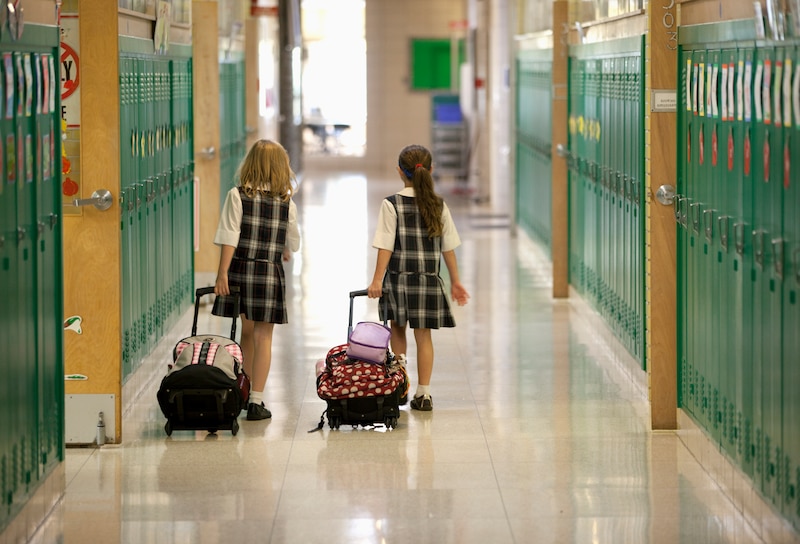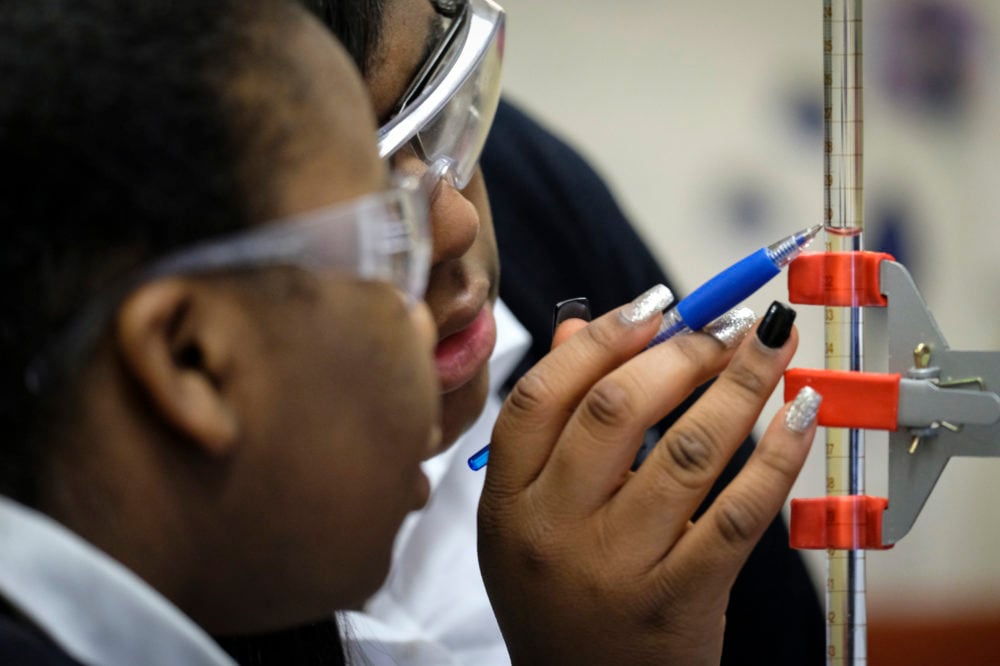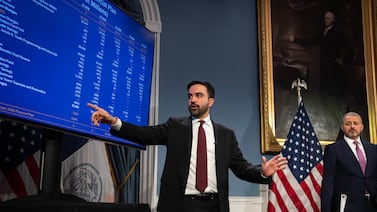Sign up for Chalkbeat’s free weekly newsletter to keep up with how education is changing across the U.S.
North Carolina’s Josh Stein recently became the first Democratic governor to embrace a new federal school choice tax credit — right after vetoing a bill in support of it.
Stein’s veto statement rebuffing Republican lawmakers’ effort to enroll North Carolina in the program described the tax credit, which Congress included in a budget bill backed by President Donald Trump, as bad policy that would funnel “billions in tax giveaways to wealthy parents” whose children already attend private school.
But the program could also help public school students, he said. And the law gives governors the final say over whether their states participate.
“I see opportunities for the federal scholarship donation tax-credit program to benefit North Carolina’s public school kids,” Stein wrote on Aug. 6. “Once the federal government issues sound guidance, I intend to opt North Carolina in so we can invest in the public school students most in need of after school programs, tutoring, and other resources.”
Many Democratic governors have opposed vouchers as diverting public money to private schools. But the tax-credit program doesn’t touch state budgets — instead the federal government reimburses taxpayers for donations to scholarship-granting organizations. And the law allows donations to pay for tutoring and other educational expenses for both private and public school students, not just private school tuition, at a time of growing budget uncertainty.
Chalkbeat asked all 23 Democratic governors whether they plan to opt into the federal tax-credit scholarship. Only two said no, saying it would hurt public schools. Stein’s veto statement represents the first tentative yes. Another indicated he’s “excited” about the program’s potential to help kids from low-income backgrounds. Others declined to comment or said they were waiting to learn more about the program while reiterating their support for public schools.
The hesitation of so many governors underscores the challenges facing the Democratic Party in defining its own education agenda and reconnecting with key constituencies. The gap leaves room for lobbying and political realignments.
Among the groups trying to sway the conversation is Democrats for Education Reform, which for nearly two decades opposed vouchers. CEO Jorge Elorza this year called on Democrats to embrace private school choice as a progressive value.
“What we are trying to do is get Democratic governors to see the possibilities in this,” Elorza said. “A lot of Democrats are choice-curious. Part of the work we’re doing is providing political cover, but we’re also trying to help them see how this advances their own priorities.”
Whether the tax-credit scholarship does, in fact, advance Democratic priorities could depend on rules the Trump administration still needs to develop. They could end up limiting governors’ ability to steer money to the neediest students.
In that scenario, given Democrats’ argument that the budget bill mostly helps the wealthy, “why would they then support a tuition tax program that essentially does the same thing, that gives money disproportionately to wealthy families who already have their kids in private schools?” said Thomas Toch, director of the think tank FutureEd. “Is that an argument that a Democrat wants to run on?”
Tax-credit program gives school choice supporters a foothold
Starting in 2027, the tax-credit scholarship program will offer taxpayers a dollar-for-dollar credit on their federal income tax for donations up to $1,700 to eligible scholarship-granting organizations. The money can go toward any expense allowed under Coverdell education savings accounts, which includes tuition, tutoring, specialized services for children with disabilities, and computers.
Families earning up to 300% of area median income qualify. That threshold includes well-off families in expensive urban areas but might exclude middle-class families in some rural communities.
Because of how the bill evolved in Congress, scholarship groups will need to raise a lot of money from small donors to generate significant revenue, and they’ll need to fight state-by-state battles to expand the program’s reach.
“The original goal was to bring school choice to all 50 states,” said Rob Enlow of the advocacy group EdChoice. “This does not do that. It brings the potential for school choice to all 50 states. It gives the advocates in those states something to grab onto.”
Norton Rainey, CEO of ACE Scholarships, is happy to grab on. Over 25 years, ACE has given out some 110,000 scholarships to students from low-income backgrounds worth a collective $333 million. He’s prepared to make the case to donors and governors that these scholarships transform lives and deserve their support.
“It’s a game changer for our parents, our kids, our communities, our country,” he said. “I think this is opening up the flood gates.”
Greta Alexander sent four boys to Fort Worth public schools where they struggled to learn in crowded classrooms and where they “sometimes had to fight.” Her youngest son got caught up in drugs. She wanted something different for her daughter Miracle — and an ACE scholarship provided it.
Miracle got one-on-one attention, a safe learning environment, and advanced academics at Temple Christian School, Alexander said.
“That she had the opportunity to be in an environment where she could thrive meant the world to us,” said Alexander, who testified in support of Texas’ voucher expansion and hopes the federal program helps even more students. “I’m so excited that other children will have the opportunity for that.”
Federal rules could sour Democrats on tax credits
Stories like Alexander’s highlight the crux of the school choice debate, said Elorza of Democrats for Education Reform, which is that “across the country, too many schools are just not getting it done for kids.”
School choice also polls well among working class parents of color, a key Democratic constituency where Republicans have made inroads. The tax credits represent “literally free money” to help these families, he said.
But governors like Pennsylvania’s Josh Shapiro, who once supported vouchers, are waiting on federal regulations that won’t be finalized by the Treasury Department for some time. They could dictate the extent to which Democratic governors can steer money towards certain student groups, or put conditions on private schools that ultimately benefit from the tax credits.
Education advocates also wonder whether these rules will let a scholarship-granting organization raise money for public-school tutoring programs, or only for private services. Or could states find a way under the regulations to turn the money into a public school enrichment fund?
“The Shapiro Administration is reviewing potential impacts of the new federal school tax credit provision, which does not go into effect until 2027, and awaiting additional federal guidance,” spokesperson Manuel Bonder said in a statement.

While the law requires participating governors to submit a list of eligible scholarship-granting organizations each year, federal rules are unlikely to grant governors the ability to pick and choose among them, said Jim Blew, co-founder of the Defense of Freedom Institute, a conservative think tank.
Governors could encourage the formation of groups that align with their values and help them raise money, Blew said — but the price will be accepting organizations they disagree with.
In Illinois, where lawmakers let a state tax-credit scholarship program expire a few years ago, Gov. J.B. Pritzker said he’s concerned about enabling discrimination. But he didn’t rule out Illinois participating.
In response to a reporter’s question last month, Pritzker said the program would have to be inclusive, and “not just a program that’s about private schools, sometimes religious schools, and sometimes schools that would reject having an LGBTQ member as a teacher.”
Colorado Gov. Jared Polis, who supported versions of a state voucher proposal early in his political career, “is excited by the possibility of unlocking new federal tax credits for donations to help low-income kids achieve,” spokesperson Eric Maruyama said. “He encourages the administration to ensure these tax credits lead to improved student outcomes and maintain maximum flexibility for states who choose to participate in this program.”
Other governor’s offices did not respond to Chalkbeat, said they had no comment at this time, or said they were reviewing the federal legislation to understand it better.
So far, only Oregon Gov. Tina Kotek and New Mexico Gov. Michelle Lujan Grisham said they would not opt in.
Michael Coleman, a spokesperson for Lujan Grisham, said she is concerned students with disabilities might be shut out of the program because private schools aren’t required to admit them; that public schools could lose more students; and that there is no guarantee schools receiving vouchers would provide a high-quality education.
Critics also fear the tax credits could be used to justify cutting federal education spending in the future.
Voters have yet to support vouchers at the ballot box. But Blew believes the opt-in decision could become a potent issue in 2026 gubernatorial races and force a conversation about school choice that puts foes of the tax credits at a political disadvantage.
“You’ll have the education freedom candidates,” he said, “and they will be both Democrats and Republicans.”
Purple states could see power struggles over participation
Education politics can be particularly complicated in states with divided government, such as North Carolina.
Voters there backed Donald Trump in the last three presidential contests and at the same time elected Democratic governors. Republicans lawmakers overrode the veto of the previous Democratic governor to launch a major voucher expansion in 2024. Some Democrats have broken ranks to join Republicans on school choice bills.
Partners/Parents for Educational Freedom said in a statement that Stein’s veto “protects the status quo, deflects from real solutions, delays greater opportunity for students, and signals to every parent that their child’s educational opportunity depends on their zip code, their parents’ income, and political games.”
The advocacy group wants lawmakers to override Stein’s veto.
Heather Koons, communications and research director for the advocacy group Public Schools First NC, sees the federal tax-credit scholarship as “just another voucher program” and fears that any money for public school students will amount to “crumbs.”
“Gov. Stein has been a great friend to public education, and I don’t want to second guess him,” she said. “I’m sure he’ll do everything he can to make lemonade out of lemons, if lemons are going to be shoved down our throat anyway. Ultimately I wish this never existed.”
Erica Meltzer is Chalkbeat’s national editor based in Colorado. Contact Erica at emeltzer@chalkbeat.org.






